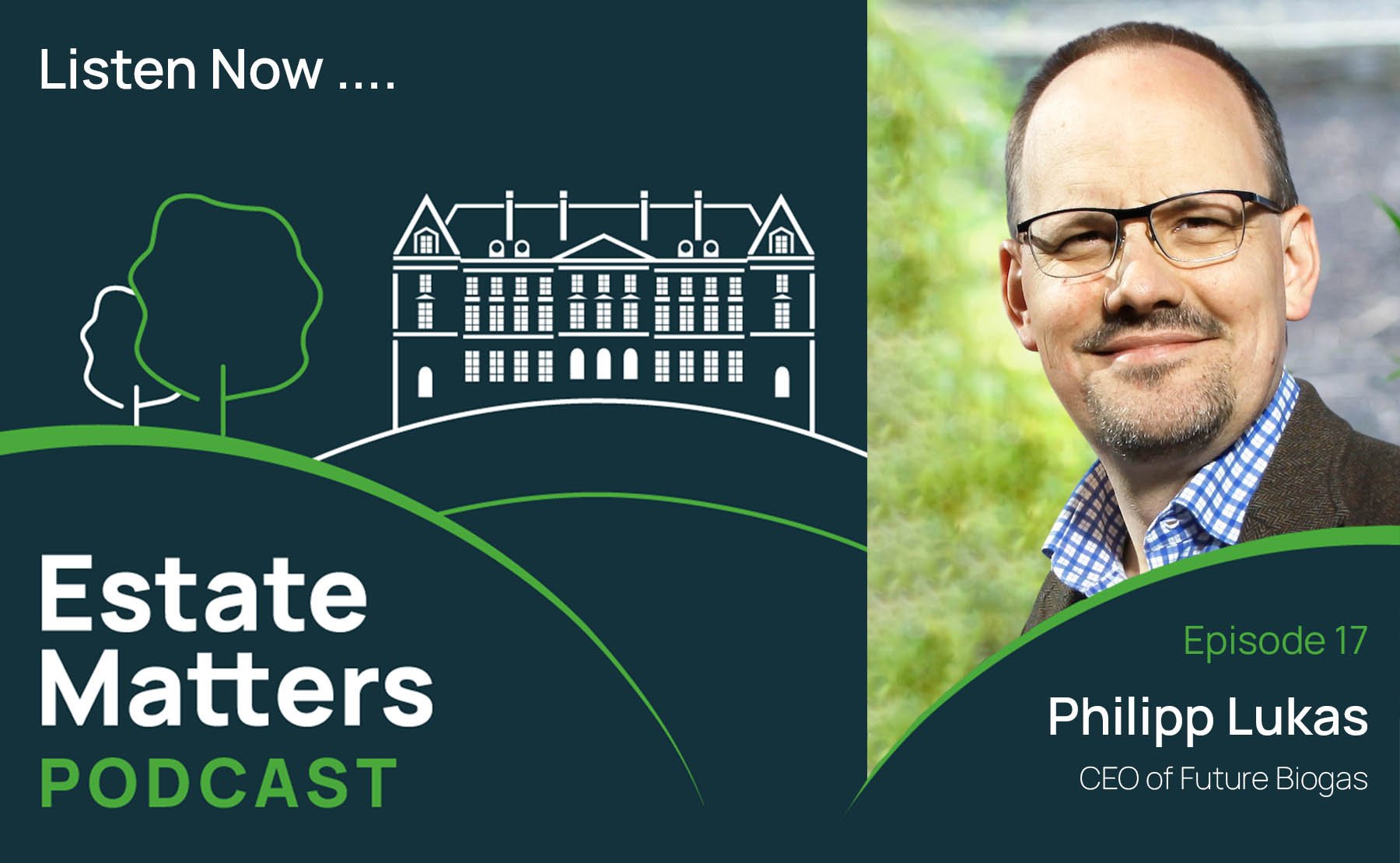Estate Matters Episode 17: Philipp Lukas - Future Biogas | How to talk about renewable energy
There is a good story to tell about the production of ‘green gas’ – and landowners and farmers producing the raw material at the start of the process can be proud of what they do and should be ready to talk about it, says Philipp Lukas, Chief Executive Officer of Future Biogas.
He tells the latest episode of the Estate Matters podcast that growing crops to produce biomethane makes a positive contribution to reducing greenhouse gases, helps mitigate climate change and improves the soil health and biodiversity on farms.
And he says that by using social media channels, websites and traditional media outlets, farmers and landowners – with the support of public relations consultants - can and should promote their work.
Philipp tells Estate Matters’ host Anna Byles that Future Biogas was launched in 2010. It takes energy crops grown by farmers and converts them, through anaerobic digestion, into biomethane at 12 plants operated across the East of England .
The gas is fed directly into the grid and a by-product, called digestate, goes back to the farms as an organic fertiliser. Future Biogas is also pioneering Project Carbon Harvest to remove the second by-product, biogenic CO2 , from the atmosphere.
Philipp, who trained as a lawyer but always had a fascination with renewable energy, started in the business with his father, initially making bioethanol to run cars. The business switched to anaerobic digestion as it became clear there was a growing need for more renewable energy.
He says there are challenges in winning public support when a new plant is proposed but that objections can be successfully overcome with the right messaging. Future Biogas works on public consultations with KOR Communications’ public affairs specialist Andrew Howard, who also joins the podcast.
Philipp says fully consulting with stakeholders, including people near a planned site, is essential before establishing a new plant. Concerns from neighbours often centre around the fear of smells, heavy traffic, an unsightly installation and the use of farmland to grow energy crops rather than produce food.
But he believes showing people plants already in operation often allays their fears. “If you take people to an existing site they will often say: ‘Oh it’s not as bad as we thought.’”
He says winning over farmers to supply feedstock – the crops that power the plants – is generally easier than persuading neighbours and the general public. “The biggest thing farming needs to do is decarbonise and the biggest targets Defra has set at the moment under the new subsidy regimes and the Environment Act are all around reducing pollution and increasing biodiversity.”
Growing feed stocks for AD plants contributes to reducing the carbon outputs on farms, improves soil health and offers farmers a crop that they can sell for a profit as part of their rotation. In the East of England, where growing arable crops like wheat is the major agricultural activity, it makes sense to include energy crops in the farming plan.
Andrew agrees that farmers are often keen to do their bit, while the general public sometimes needs more convincing. “It’s about a conversation and it’s about education and it’s about taking people with you on a journey,” he said.
“You need to be consistent in your messaging. You do keep in touch with people, you reply to them, you are nice and friendly and polite and understand that people will have concerns and that from their perspective those are genuine and usually heartfelt. Be sympathetic and understanding, but also explain why, nationally and globally, we need to re-think how we produce energy because the future’s pretty bleak if we don’t.”
Future Biogas has embarked on an ambitious project to make its operations even more environmentally friendly.
Project Carbon Harvest has three aims – to grow more energy crops on farms to help them decarbonise and boost soil health; turn those crops into biomethane and sell it to corporate buyers and use the pure C02, a by-product of the process, in various industrial processes, from aviation to pharmaceuticals – or put it into deep storage.
Philipp says that landowners and farmers who grow energy crops now have ample ways to tell their positive stories and should be proud of playing their part in a green revolution. “The wonderful thing for landowners and estates is that in the past there wouldn’t have been these channels to talk about all the things they are doing on the farm,” he says.
“Whether it is showing the way they have changed their farming practices, whether it’s the way they are managing their rented cottages or whether it’s the way they are bringing an anaerobic digester to the estate or to the farm.
“In the past it was quite difficult to disseminate that information. Now, if you are doing it properly on a website and on social media it can be a hugely powerful tool to get people on board.”
He says farming – which now often includes growing crops for energy, as well as food – has not always been good at telling its own positive stories. “It doesn’t tell a great story about the farming community that its most powerful advocate is Jeremy Clarkson,” he says.
Philipp also notes Clarkson, who has presented four popular series of Clarkson’s Farm on TV and won plaudits from the industry, still doesn’t have an AD plant on his Cotswold holding. “That’s series 5 – right there,” he says, only half-jokingly. Given Future Biogas’s plan for growth, you wouldn’t bet against it.

